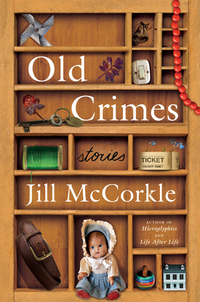Old Crimes by Jill McCorkle
 Wednesday, January 3, 2024 at 5:48AM
Wednesday, January 3, 2024 at 5:48AM 
Published by Algonquin Books on January 9, 2024
Most of the stories in Old Crimes feature women who have reached or lived beyond middle age. An exception is “Filling Station,” a story about a man in his sixties who rents a room in a house where his grandparents used to live, a house that has been converted into a gas station. The room is an excuse to stay away from his wife, as is the time he devotes to a dying high school teacher he regards as a mentor. The other exception follows “a lineman for the county” who prides himself on his competence (he’ll survive the coming apocalypse because he is good with tools and knows how things work) but regrets his failure to make his relationships work.
“Low Tones” is the story of a woman who isn’t prepared to be old. She can no longer hear low frequencies, a convenient excuse for developing a case of selective hearing. She regrets the moments in her life when she wasn’t the person she wanted to be. Her husband has “a bad illness that leaves him making hand signals” and she doesn’t know if she can cope with him. Cancer has reached his brain and makes him say awful things to her, although he’s always been abusive. She’s annoyed by the young people she sees making out in a truck and feels empathy for an unrepentant woman who murdered her husband. I think the point of the story is that life doesn’t always turn out as one hopes, and never will if we don’t take control of it while we still can.
My favorite in this collection is “Commandments.” Three women meet regularly to gripe about the man who dated and dumped them all. They all aspired to be pampered for the rest of their lives by a rich man but none of them succeeded. This seems less than tragic, given that they all appear to have achieved pampering by less wealthy but comfortably affluent men. Each woman has been in therapy but they disregard their therapists’ advice to move on with their lives and devote their meetings to “beating that decayed horse down to its bare bones.” The story works because the waitress who brings their lunch is more interesting than the three women. She doesn’t seem to envy their designer clothes and purses. She knows the man they hate, recognizes him as an asshole, and governs herself accordingly. The waitress — “a living Bible of truth and common sense” — teaches a good lesson about karma and wisdom that surpasses anything the women have heard from their therapists.
The protagonist in “Swinger” is “the kind of invisible woman who might be referred to as sturdy or dependable, smart and practical.” She was living with a married man, waiting for him to get divorced, for three years before he died. The man had Polaroids of naked women that he kept in a shoe box, photos of his conquests, but never took one of her and now never will. An encounter with a burglar at the novel’s end gives the story a heartening twist.
A woman who got a divorce, relocated with the kids, found a new job, and dealt with the death of her father and decline of her mother never had time to have the breakdown she deserved. In “Sparrow,” memories of the past (including an old story about a boy’s disappearance that still haunts the town to which the woman moves) interweave with experiences in the present (including speculative whispers about the death of a young mother and her son). The story ends with a suspected child snatching. The point of the story seems to be that people want to keep themselves and their children safe but have no idea how to do it.
The other stories in the book are well crafted but I found them to be of less interest. A woman realizes that “evil and violent things” have always happened and always will. The purchase of an old confessional prompts characters to speak of their relatively inconsequential sins. A retired school librarian tries to teach biblical values to Bible-belters who don’t want to feed or educate children. A family gathering causes a drama teacher to see life as a play that is well into its third act. These and other stories are devoted to insightful character building, but they generally seemed longer than necessary, given how little the characters do after they are built. Still, the best stories in the collection make the book worth reading.
RECOMMENDED
Reader Comments